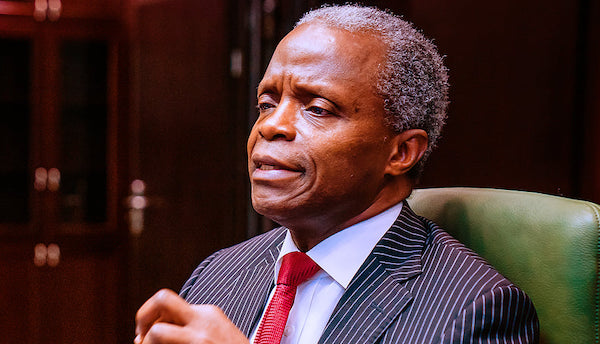Aso Rock Watch
ASO ROCK WATCH: Osinbajo’s push for young candidates in 2023. Two other talking points

Vice President Yemi Osinbajo last week charged Nigerian youths to vie for elective positions in the 2023 general elections.
Osinbajo’s charge is not unconnected with the increasing calls for active youth participation in the nation’s politics as the 2023 elections draw near.
We tracked two other stories that emerged from the seat of power last week for your reading delight.
Osinbajo’s push for young candidates
On October 4, Osinbajo called for active youth participation in 2023 elections. The Vice-President made the call at the opening of a two-day retreat for young legislators at the Federal and State levels held in Lagos.
He said: “In preparation for 2023 general elections, we must realise that greater participation of our youths should not be mere rhetoric. Power is never handed over on a platter. If you won’t bid, you can’t win. We must also register to vote.”
Osinbajo’s remark is an invitation to a paradigm shift that would see to an overthrow of a political order in which the older generations have held on to the levers of power for 61 years without a significant leap in progress.
Indeed, the statement serves as a wake-up call for the youths to stop being politically insular and play a critical role in the changes they have been advocating.
Although Osinbajo’s position reinforces the current administration belief in the youth as future leaders of this country, he must, however, appreciate that most youths in Nigeria currently lack the capacity to challenge for elective positions.
The huddles are too visible to pretend that they do not exist. From bogus fees charged by political parties to a culture of sit-tight syndrome, Osinbajo must resolve to lead a crusade to firm his commitment to change.
One big leap will be to drive a continuous conversation that will not only entrench good governance but further a democratization of the political space to deliberately install a new order.
Because power is not given, it would be interesting to see how the youths leverage their voting population and respond to Osinbajo’s clarion call.
Two other talking points
Buhari’s endless promises
President Muhammadu Buhari on October 9 vowed to end violent crimes in Nigeria.
Buhari, who stated this during the Passing Out Parade of 68 Regular Course of the Nigerian Defence Academy (NDA) in Kaduna, said: “I assure you that this administration will continue to do everything within the ambit of the law to eliminate all forms of violent crimes that are creating fear and anxiety among the citizenry.”
Mr President must come to the understanding that the prevailing insecurity in the country has been the major yardstick used by Nigerians to rate his government, despite the perceived successes recorded in other areas.
Read also: ASO ROCK WATCH: Buhari’s claim on govt achievements. Two other talking points
To many Nigerians, his continuous promise amidst his failure to end violent crimes in the country is already discomforting.
Under the President’s watch, the Boko Haram insurgents and bandits have turned the North-East, North-West and some parts of the North-Central to killing fields. The President sure has his work cut out because Nigerians are tired of empty promises and want concrete action from the government as the hoodlums continue to hold the country by the jugular.
Ensuring that Nigeria remained a safe, secure, and indivisible entity is one legacy Buhari should strive to bequeath to his successor as his time in power draws to a close.
Defending rising debts
President Buhari on October 7 justified Nigeria’s rising debt profile, noting that it was sustainable.
The President, who presented the 2022 budget of N16.39 trillion to a joint session of the National Assembly, said: “We plan to finance the deficit mainly by new borrowings totalling N5.01 trillion, N90.73 billion from privatisation proceeds and N1.16 trillion drawdowns on loans secured for specific development projects.
“Some have expressed concern over our resort to borrowing to finance our fiscal gaps. They are right to be concerned. However, we believe that the debt level of the Federal Government is still within sustainable limits. Borrowings are to specific strategic projects and can be verified publicly.”
The recourse to more loans to finance the 2022 budget and or run the affairs of Nigeria will continue to elicit reactions from Nigerians.
Naturally, the varied arguments have centered not just around the sustainability of such an approach but the growing tendency to misuse the same loans and throw the country into more debts.
Although the Federal Government has explained severally that the loans were required for the execution of critical projects in the country, it is baffling that paucity of funds could be alluded to as responsible for the slow take-off or delay in the completion of some of these projects.
An interesting poser, therefore, would be to query what may have become of these funds. Does it mean that some of them could have been diverted into some other uses or found their way into personal accounts?
A plausible response to the observed gaps is to challenge the President and his team to critically review the country’s cost of governance structure while ensuring better internal controls in the management of Ministries, Department and Agencies (MDAs) that have been accused of under-remitting revenues.
Join the conversation
Support Ripples Nigeria, hold up solutions journalism
Balanced, fearless journalism driven by data comes at huge financial costs.
As a media platform, we hold leadership accountable and will not trade the right to press freedom and free speech for a piece of cake.
If you like what we do, and are ready to uphold solutions journalism, kindly donate to the Ripples Nigeria cause.
Your support would help to ensure that citizens and institutions continue to have free access to credible and reliable information for societal development.
























